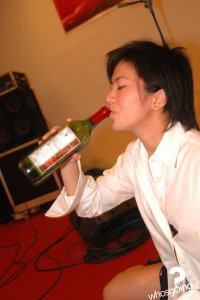
Couple sets up shop in Houston to import, sell French wines
Tim and Phyllis Smith own a "winery"near Rice Village where they import and sell French wines. In order to operate their business, they had to obtain a winery license.
In 1973, Tim Smith bought a grand-cru Beaujolais in Paris for 80 centimes. That bottle of Morgon, for an outlay of about 20 cents, proved a life-changing experience.
"I thought I'd died and gone to heaven," he recalls wistfully.
Now 35 years later, Smith owns a winery in what was once a photographer's studio near Rice Village. Make that a "winery," since what Smith and his wife Phyllis really do with their French Country Wines is import and sell. In order to do both legally in Texas, they had to obtain a winery license.
If he's not yet a superstar in the cellar, he's got a refined taste for wines made by other people, especially those who are making it in small, reasonably priced quantities far off the beaten path, mostly in the South of France. One of Smith's Châteauneuf-du-Papes, the Domaine du Banneret, comes from a well-situated producer who isn't known even to the local tourist office, probably because he produces at most 400 cases each year.
It sells for $34, right at the top of Smith's price ladder. Fresh and harmonious in the glass, with a nice long finish, the 2004 Banneret drinks like it should cost at least twice that much.
"This wine is a perfect example of what we're trying to do," Smith said. "We wanted to expose people to the kinds of wines we like, wines you just couldn't find here. (The big importers) are looking to buy five pallets at a time. Some of our producers don't make five pallets in a year."
A retired litigator, Smith ultimately found his way into the wine trade to "keep me off the streets." His passion is finally close to profitable — despite the weak dollar, the numbing bureaucratic minefield one must traverse to become an importer-retailer and the fact that his portfolio consists of boutique producers that almost nobody in Houston had heard of.
"The label-approval process took six months," Smith said. "I never realized they'd be so nitpicky about it."
Smith acknowledges his naiveté as a fledgling wine merchant, admitting he might never have moved forward with his venture without the support of a certain Frenchman.
Francophiles Tim and Phyllis knew of Jean-Marc Espinasse only through his Web site, which featured a wine every day, and that of his wife Kristen, who's behind french-word-a-day.com. But when Smith e-mailed him, Espinasse replied within 24 hours. It seemed he had a small wine brokerage and was looking to expand in the U.S. market. They agreed to meet in Phoenix, where Kristen is from, and forged a partnership. About 60 percent of the wines Smith sells are acquired through Espinasse, including Espinasse's own Rouge-Bleu.
"As it turned out, we have very similar palates," Smith said. "But he has encouraged me to explore and find other wines. I want to keep our portfolio vibrant."
Smith's Web site is excellent, informative and easy to navigate. Through the Internet and word of mouth, augmented with well-attended biweekly tastings — there's one tonight at 6 p.m., featuring cheese from the Houston Dairy Maids — his customer base is expanding, and he's gaining restaurant placements, including Café Rabelais, Brasserie Max and Julie and, most recently, Aura.
If you're inclined to visit the shop, it's best to call first: 713-993-9500. As Smith says, "It's just me, and sometimes I've got to run errands." (Phyllis has a "day job" as director of projects for the M.D. Anderson Cancer Center.)
A more pleasant, less pretentious couple you will never find in the wine world. They know they're just the messengers; in the end, it's all about the wine they sell.
DALE ROBERTSON
Houston Chronicle






